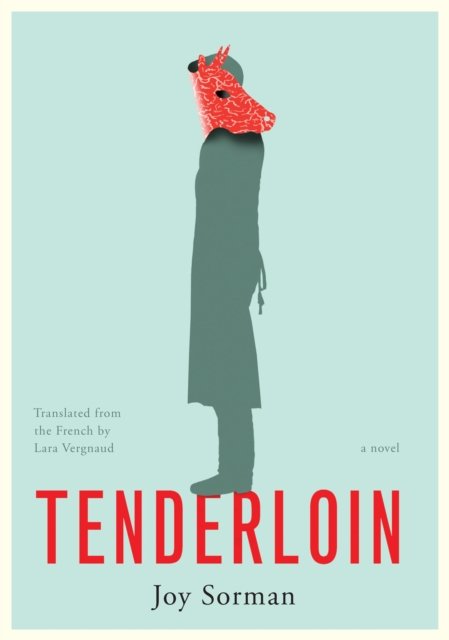Tenderloin by Joy Sorman
Can killing be an act of love? Hypnotic, gruesome, and exultant, Joy Sorman’s macabre ballet whirls from industrial slaughterhouses to the boutique butcher shops of Paris. Pim is a delicate youth—stringy, solemn, and prone to bouts of unexplained weeping. When he enrolls in trade school as an apprentice butcher, his mentors have low expectations, but his lanky body conceals a peculiar flame: a passionate devotion to animals.
In an industry that strives to distance the chopping block from the dinner plate, his ardor might seem like a handicap, but Pim rises through the knife-wielding ranks with a barely-tethered zeal. He scours blood from floor mats and stacks carcasses in the cold room by day. By night he tries to slake his appetites: at the table, over boudin sausage and steak tartare, and in bed, with women whose flanks, ribs, and haunches he maps as they undress each other.
Pim’s professional successes mount but his cravings gnaw. In the library he teases out histories, like the blood-drinking forerunners to vampirism or the Medieval trial of a killer pig, sentenced to death by hanging. Meat crowds his waking thoughts.
Even as he carves ripe flesh from exquisite bone, he labors to close the gap between man and beast—to be seen, understood, even loved, by a primordial mind. Will this ravenous obsession yield to madness, or to ecstasy?With shades of Upton Sinclair’s The Jungle, Joy Sorman’s Tenderloin is an ethical foray, fever dream, and paean to an ageless hunger. Vegetarians and carnivores alike are invited to feast at this sumptuous literary table.
After all, we are what we eat.
Can killing be an act of love? Hypnotic, gruesome, and exultant, Joy Sorman’s macabre ballet whirls from industrial slaughterhouses to the boutique butcher shops of Paris. Pim is a delicate youth—stringy, solemn, and prone to bouts of unexplained weeping. When he enrolls in trade school as an apprentice butcher, his mentors have low expectations, but his lanky body conceals a peculiar flame: a passionate devotion to animals.
In an industry that strives to distance the chopping block from the dinner plate, his ardor might seem like a handicap, but Pim rises through the knife-wielding ranks with a barely-tethered zeal. He scours blood from floor mats and stacks carcasses in the cold room by day. By night he tries to slake his appetites: at the table, over boudin sausage and steak tartare, and in bed, with women whose flanks, ribs, and haunches he maps as they undress each other.
Pim’s professional successes mount but his cravings gnaw. In the library he teases out histories, like the blood-drinking forerunners to vampirism or the Medieval trial of a killer pig, sentenced to death by hanging. Meat crowds his waking thoughts.
Even as he carves ripe flesh from exquisite bone, he labors to close the gap between man and beast—to be seen, understood, even loved, by a primordial mind. Will this ravenous obsession yield to madness, or to ecstasy?With shades of Upton Sinclair’s The Jungle, Joy Sorman’s Tenderloin is an ethical foray, fever dream, and paean to an ageless hunger. Vegetarians and carnivores alike are invited to feast at this sumptuous literary table.
After all, we are what we eat.
Can killing be an act of love? Hypnotic, gruesome, and exultant, Joy Sorman’s macabre ballet whirls from industrial slaughterhouses to the boutique butcher shops of Paris. Pim is a delicate youth—stringy, solemn, and prone to bouts of unexplained weeping. When he enrolls in trade school as an apprentice butcher, his mentors have low expectations, but his lanky body conceals a peculiar flame: a passionate devotion to animals.
In an industry that strives to distance the chopping block from the dinner plate, his ardor might seem like a handicap, but Pim rises through the knife-wielding ranks with a barely-tethered zeal. He scours blood from floor mats and stacks carcasses in the cold room by day. By night he tries to slake his appetites: at the table, over boudin sausage and steak tartare, and in bed, with women whose flanks, ribs, and haunches he maps as they undress each other.
Pim’s professional successes mount but his cravings gnaw. In the library he teases out histories, like the blood-drinking forerunners to vampirism or the Medieval trial of a killer pig, sentenced to death by hanging. Meat crowds his waking thoughts.
Even as he carves ripe flesh from exquisite bone, he labors to close the gap between man and beast—to be seen, understood, even loved, by a primordial mind. Will this ravenous obsession yield to madness, or to ecstasy?With shades of Upton Sinclair’s The Jungle, Joy Sorman’s Tenderloin is an ethical foray, fever dream, and paean to an ageless hunger. Vegetarians and carnivores alike are invited to feast at this sumptuous literary table.
After all, we are what we eat.






